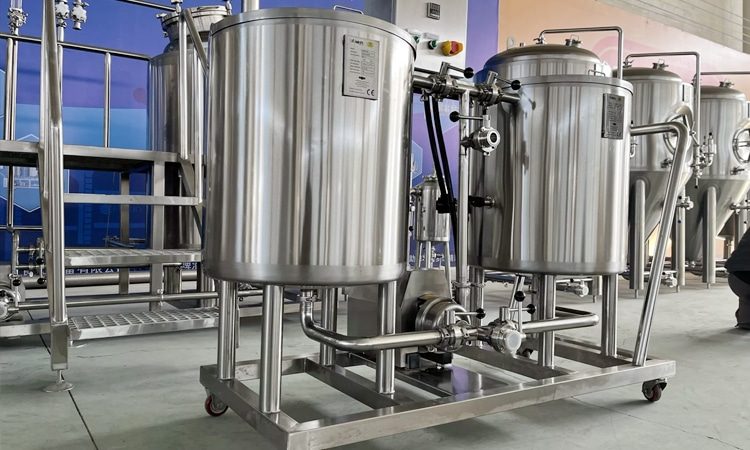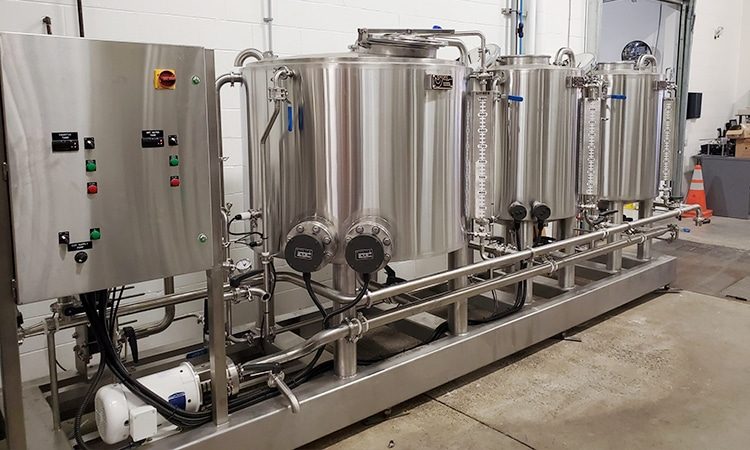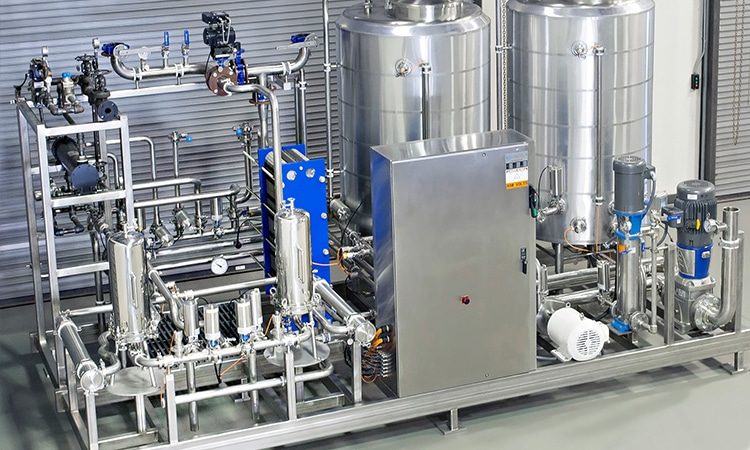Main Body Warranty
Auxiliary Warranty
Equipment Type
Types of Brewery CIP Systems
- CIP skid systems are comprehensive, compact units that integrate all necessary components for automated cleaning processes into one portable platform.
- CIP skid systems include tanks, pumps, heat exchangers, valves, instruments, and control panels, all mounted on slide rails for easy installation and movement.
- CIP skid systems are ideal for breweries looking for an efficient, automated cleaning solution that requires minimal space and setup time.


- CIP station systems are versatile, modular units designed to adapt to a variety of cleaning tasks within a brewery.
- CIP station systems consist of multiple tanks and pumps configured to handle different cleaning agents and processes, such as caustic cleaning, pickling, and disinfection.
- CIP station systems offer flexibility and scalability, allowing breweries to customize their cleaning setup based on their specific needs and throughput.
- Single caustic tank systems are a simplified and cost-effective solution for breweries with lower cleaning requirements or limited space.
- Single caustic tank systems have a single tank dedicated to caustic washing and the associated pumps, valves, and controllers.
- Single caustic tank systems are suitable for small breweries or specific cleaning applications where a dedicated caustic cleaning process is sufficient.

Advantages of Brewery CIP Systems

Improve cleaning efficiency
Brewery CIP systems streamline the cleaning process, reduce downtime between batches, and maximize production efficiency. With automated cleaning cycles and precise control of cleaning parameters, breweries can optimize their workflow and minimize manual labor.

Consistency and standardization
With predefined cleaning protocols and automated cycles, brewery CIP systems ensure consistent cleaning procedures for all batches and equipment. Standardized cleaning processes help maintain uniform cleanliness levels, improving product quality and reducing variability in brewing results.

Labor savings and cost efficiency
By automating cleaning tasks, brewery CIP systems reduce the need for manual labor, freeing up personnel to perform other important brewery operations. Over time, reduced labor requirements translate into cost savings.

Extend equipment life
Proper cleaning and maintenance can help extend the life of your brewery equipment. Brewery CIP systems remove sediments, residues, and contaminants that can lead to corrosion, scaling, and microbial growth, extending the life of the equipment and reducing the frequency of costly repairs and replacements.

Optimize resource utilization
Compared to manual cleaning methods, brewery CIP systems minimize the consumption of water, chemicals, and energy, thereby reducing operating costs and environmental impact. Precise control of cleaning parameters and dosage ensures optimal utilization of resources without compromising cleaning results.

Improve product quality and consistency
Cleaning equipment can help produce high-quality beer with consistent flavor profiles and characteristics. By ensuring thorough, hygienic cleaning of brewery equipment, brewery CIP systems help maintain product quality and consistency, increasing customer satisfaction and brand reputation.
Why choose ZYB Craft

Expertise and experience
- With many years of experience in the beer equipment manufacturing industry, ZYB Craft has unparalleled expertise in the design and production of brewery CIP systems.
- Our team of engineers and technicians have an in-depth understanding of brewing processes and hygiene requirements, ensuring our CIP systems are carefully designed to meet the unique needs of breweries.
Customization and flexibility
- ZYB Craft understands that every brewery is different, so we offer customizable brewery CIP systems to fit a variety of brewery setups and production volumes.
- Whether you need a compact CIP skid for a small craft brewery or a modular CIP station for a large production facility, we can customize our systems to your specific requirements.


Quality and durability
- Quality is at the heart of everything we do at ZYB Craft. Our brewery CIP systems are built to the highest standards using quality materials and components, ensuring durability and long-term performance.
- Strict quality control measures and testing procedures ensure that every system we produce meets our strict quality standards before leaving the factory.
Comprehensive support and services
- At ZYB Craft, we believe that excellent customer service is as important as great products. Our dedicated team provides comprehensive support including installation assistance, technical support, and ongoing maintenance services.
- We are committed to building lasting relationships with our customers and providing timely assistance and solutions to ensure the continued success of their brewery operations.

Get CIP system solutions
Frequently Asked Questions
What Are The Different Types of Brewery CIP Systems?
- Manual CIP System: The manual CIP system involves manual operation and control of the cleaning process. The brewer manually connects hoses, opens and closes valves, and monitors cleaning progress. This type of system is often found in small craft breweries with lower production volumes and simpler equipment setups. It provides basic cleaning functions but requires more labor and involvement from brewery employees.
- Semi-Automatic CIP System: The semi-automatic CIP system combines manual operation with some automation. It usually includes pre-programmed cycles, digital control, and automatic metering of detergent. Operators still need to connect hoses, start and stop the cleaning process, and monitor progress, but some tasks are automated, reducing manual labor.
- Fully Automatic CIP System: The fully automatic CIP system provides a high level of automation and control. It involves a programmable logic controller (PLC) or computer-based system to manage the cleaning process. The system can be programmed for specific cleaning protocols, and parameters such as temperature, flow rate, and chemical concentration can be precisely controlled. Fully automatic CIP systems are usually used in large breweries with high output and complex equipment settings.
- Mobile CIP System: The mobile CIP system is a portable unit that can be moved to different locations within the brewery. It usually consists of a compact self-contained unit with a tank, pump, and controller mounted on a mobile cart or skid. Mobile CIP systems are flexible and can be used to clean multiple pieces of equipment or areas without the need for permanent installation.
- Centralized CIP Systems: The centralized CIP systems involve dedicated cleaning systems that service multiple brewing vessels and equipment from a central location. This system is typically used in large breweries with a large number of production lines and multiple cleaning points. It enables efficient use of resources, central control, and monitoring of the cleaning process.
What Is A Brewery CIP System?
- Storage Tanks: CIP systems have dedicated storage tanks for storing cleaning and sanitizing solutions. These tanks are usually equipped with heating elements to control the temperature of the solution.
- Pumps: Pumps are used to circulate cleaning and sanitizing solutions through brewery equipment. They provide the flow and pressure necessary to effectively clean and rinse surfaces.
- Chemical Dosing: CIP systems include chemical dosing systems to accurately measure and add cleaning and sanitizing agents, such as caustic solutions, acid-based cleaners, or disinfectants, to the cleaning process.
- Control Panel: The CIP system has a control panel that allows the operator to set and monitor various parameters such as solution temperature, flow rate, and duration of cleaning cycles. This panel ensures that the CIP process is carried out correctly and efficiently.
- Spray Balls And Nozzles: Spray balls or rotating nozzles are installed inside saccharification plants, fermentation tanks, and other vessels to ensure thorough coverage and distribution of cleaning and sanitizing solutions. These spray balls provide a high-pressure jet for the effective removal of contaminants.
- Pipes And Valves: The CIP system is connected to the brewery equipment through pipes and valves. Valves allow precise control of the flow, diversion, and isolation of cleaning solutions during the cleaning process.
How Much Does A Brewery CIP System Cost?
- Equipment: The cost of CIP system equipment (including tanks, pumps, valves, sensors, controllers, and automation components) may vary depending on the quality, capacity, and functionality required. Higher quality and larger capacity equipment may require higher costs.
- Customization: If the CIP system requires customization or additional functionality to meet the specific needs of the brewery, costs may increase. Customization may include specialized cleaning cycles, integration with existing equipment, or additional sensors and controls.
- Automation: The level of automation required for a CIP system affects cost. Automated systems with advanced control and monitoring capabilities tend to be more expensive than manual or semi-automated systems.
- Installation and Integration: The cost of installing and integrating the CIP system into the existing brewery infrastructure should be considered. This may include plumbing modifications, electrical work, and necessary connections to tanks and equipment.
- Suppliers And Locations: Costs may also vary depending on suppliers, locations, and local market conditions. Prices may vary based on factors such as geography, supplier availability, and competition.
How Long Does It Take For A CIP System To Clean Brewery Equipment?
- Cleaning Process: The cleaning process selected for the CIP cycle will affect the cleaning time. For example, a more intensive cleaning process with multiple steps (such as pre-rinse, caustic wash, acid wash, and final rinse) may take longer than a simple CIP process with only a few steps.
- Contamination Level: If the brewery equipment is heavily soiled or has stubborn deposits, longer cleaning times may be required to effectively remove the residue.
- Automation And Efficiency: The level of automation and efficiency of a CIP system affects cleaning time. Automated systems with precise control and optimized cleaning cycles can potentially be more efficient and complete the cleaning process faster than manual or less complex systems.
- Equipment Size And Complexity: The size and complexity of the brewery equipment being cleaned can also affect cleaning time. Larger tanks or systems with many complex parts may require more time for the cleaning solution to reach all surfaces effectively.
- Accessibility of Equipment: The ease of access to different parts of equipment can also affect cleaning time. Equipment with good accessibility results in better cleaning coverage and may reduce overall cleaning time.
What Are The Advantages of The Brewery CIP System?
- Efficiency: Brewery CIP systems efficiently and effectively clean brewery equipment without disassembly. It eliminates the time-consuming process of manually scrubbing and cleaning each piece of equipment, saving significant time and increasing productivity.
- Consistency: Brewery CIP systems ensure a consistent and repeatable cleaning process, reducing the risk of human error and variations in cleaning quality. This consistency helps maintain the required level of cleanliness and hygiene throughout the brewery.
- Thorough Cleaning: Brewery CIP systems are designed to clean all surfaces, including hard-to-reach equipment areas such as pipes, valves, and vessels. The system circulates the cleaning solution through the equipment, ensuring thorough coverage and effective removal of residue, solids, and contaminants.
- Sanitization: In addition to cleaning, brewery CIP systems often include a sanitization step. This helps to eliminate microorganisms, such as bacteria and yeast, that could pose a risk to beer quality and safety. Proper sanitization minimizes the potential for contamination and off-odors of the final product.
- Reduced Labor And Costs: Implementing a brewery CIP system reduces the labor required for manual cleaning, freeing up personnel to perform other tasks. It also reduces the need for additional cleaning supplies and utilities (such as water, detergent, and energy), resulting in potential cost savings over time.
- Flexibility: Brewery CIP systems can be customized to meet specific cleaning requirements, allowing breweries to accommodate different equipment configurations, sizes, and cleaning processes. This flexibility ensures that the system can be adapted to various brewing setups and production needs.
- Safety: Brewery CIP systems increase safety by minimizing the handling of hazardous cleaning agents and reducing the risks associated with disassembling and reassembling equipment for cleaning. They also provide controlled and monitored cleaning processes, ensuring compliance with safety regulations and reducing potential workplace accidents.
- Environmental Impact: Brewery CIP systems often incorporate water and chemical management systems that help optimize resource use and reduce environmental impact. Efficient use of water and detergents minimizes wastewater generation and reduces chemical waste disposal.
What Is The Temperature of The Water In The Brewery CIP System?
- Hot Water: Brewery CIP systems typically use hot water because it helps improve cleaning efficiency and the solubility of contaminants. The hot water temperature is usually 50°C (122°F) to 80°C (176°F) or higher. The exact temperature to choose depends on factors such as the equipment to be cleaned, the type and extent of soiling, and the cleaning agents used.
- Cold Water: Cold water is typically used for the pre-rinse and post-rinse steps in the CIP process. It helps remove loose debris and residue before and after the main cleaning cycle. The temperature of the cold water is usually the same as the ambient temperature of the brewery, but it will vary according to location and season.
- Detergent Temperature: The temperature of the water used in the CIP system can be adjusted according to the specific detergent used. Some cleaners, such as alkaline (caustic) solutions, may require higher temperatures for best results, while acid-based cleaners may be used at lower temperatures. It’s important to follow the manufacturer’s recommendations for the cleaner you use, as they often provide guidelines for the proper temperature range.
- Equipment Specifications: The temperature of the water used in the CIP system should also be within the acceptable range specified by the equipment manufacturer. Certain materials, seals, or components may have temperature limits beyond which damage may result or compromise the integrity of the device.